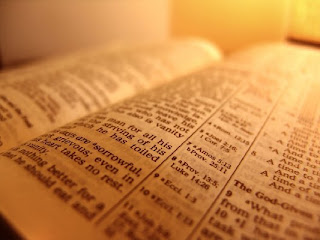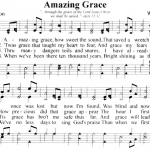Long ago, I asked Christians to explain how they read the Bible. At the time, no one wanted to tackle such a complex question in a blog post, so I tried to pry out some answers by including a question on this topic in the Ideological Turing Test. Today, I’m delighted to announce that Christian H. of The Thinking Grounds has stepped up to the plate (you may remember him from my frequent links to his series on the connection between the self and the body).
Christian has written two posts: today is a more holistic overview and tomorrow has an example of how he approaches a specific passage, so sit tight if you want to see these principles in action. Next week, Julie Robison from The Corner with a View will also guest-post on this topic.
Many thanks to them both for working through a complex question. Don’t hesitate to ask questions if you’re unfamiliar with a reference or an argument. Christian and Julie are both kind, intelligent people, so take this as an occasion for dialogue, not an opportunity to complain without offering a substantive objection. Take it away, Christian…
In a moment of nigh-unfathomable hubris, I offered to produce a guest blog post for Leah in response to one of her long-standing questions about reading the Bible. I do not set myself up as typical or admirable; I’ll simply file this under “educating non-Christians about the variety of Christianity.”
So, how do I read the Bible?
The short answer is really quite simple: poorly, idiosyncratically, and with difficulty. And this is why I shied away from writing this guest post for so long. But eventually I realized that out of the caveats and positioning and uncertainty, I could make something that seemed to resemble a method. Moreover, that method was perhaps one that I could communicate to this audience here at Unequally Yoked and that might also make a certain amount of sense to some members of this audience.
I must begin, though, with that positioning. I am non-denominational, I suppose, with ties to a few different traditions: I was baptised and confirmed in the Lutheran church and taught Sunday school there while in high school; I attended a congregational-turned-evangelical church when in my undergraduate (and I’ll note that Canadian evangelical churches are different from American ones, so don’t necessary equate them); and I have since then joined Anglican churches wherever I have lived, due in part to the liturgy and in part to the Anglican church’s more progressive attitude toward homosexuality. Given this history and my exposure mainly to mixed-denomination fellowships, my personal theology is a patchwork. Perhaps as a result of this but more likely as a result of my own disposition, I hold doctrinal positions very weakly. I am sceptical that salvation rests on my comprehension of the heresy of Docetism—or, for that matter, the true nature of the Trinity—and while I’m interested in these things, I don’t think that there’s any need for me to be certain about them. I also doubt our ability to be justifiably certain about most things, so when the stakes are low, I try not to worry about it. The last piece of positioning I think you should know is that I’ve been academically trained in literary analysis. I’m enrolled in a Master’s program in English literature. My relationship with texts is complexly theorized. I realize many people don’t actually know (or care, sadly) what goes on in literary analysis and I haven’t the space to get you up to speed. (Try getting me up to speed for a graduate program in physics in the introduction to a single blog post.) You should at least be aware that when I read any text, including the Bible, I am trying out assorted literary analytical tools on it. Not only that, but I am expected to be ready and able to revise or reject those tools based on the texts I am dealing with; if I find that formalism (aka New Criticism) cannot deal adequately with a certain text (say, The Haunting of Hill House), then I must suggest a change to the theory, not a misreading of the text, no matter how elegant I find the reasoning behind that theory. If it can’t deal with the text, we can’t accept it.
The question that most likely bothers you at the moment, though, is not what my background is but whether I read the Old Testament literally—or which parts I read literally and which parts metaphorically—and how I can make a distinction between a metaphorical Old Testament and a literal New Testament. I’m afraid I must give you the most unsatisfactory response: I don’t really know. Most of my thinking about the early OT (and the Book of Revelation) is that it’s metaphorical; the further along you go, the more it becomes literal (with the possibility of distortion or poetic embellishment.) It bothers me, this not knowing. The OT is most difficult because a lot of the time I would really prefer if it wasn’t literal. But truth, I think we know, doesn’t always bear much resemblance to what we’d like it to. This has led to more than one minor crisis.
The good news is that I’m not much interested in the dusty wars of minor kings in a distant country in a distant past. History is pretty darn cool, yes, but I’m not sure I’d bee-line for Canaan if I wanted to read about ancient dynasties. Rather, when I read the Bible, I’m interested in ethics, pragmatics, community dynamics. When I read the Bible, I want to see what happens when people go to war for faith, when people choose to obey principles over laws, when people call out kings and emperors who have been unjust. Whether these things have happened or not has no bearing on this aspect of my reading, and this is the most important aspect of my reading. Of course there are still problems here. In places in the OT, it seems as though the text encourages us to emulate characteristics of the protagonists which I do not want to emulate. The ethical teaching seems a touch off. (Or monstrously off, in the cases of genocide.) How do I deal with this?
Again, the truest answer is pretty flip: I deal with it badly, with a lot of stress and worry. But, also importantly, I deal with it fluidly. I’ll call it a mobile heuristic or a dynamic heuristic. I check the text against my moral intuition, my readerly skill, my sense of history, my personal experiences, and my faith. I also check the most obvious reading of the selected passage against where it sits in the Bible as a whole; taken on its own, it may appear to mean one thing, but as part of this much bigger text, one piece in a quilt of meaning, it may point to something quite different. I also try to check my assumptions at the door. Much of the Bible has been written over with interpretations in the course of Christian history. It’s hard to discern whether my reading of this passage is influenced unduly by previous people’s readings. I also keep a close eye on genre. (What is the intent of the passage? What are the expectations of this kind of writing? How might these two factors change what is being emphasized and what is being occluded in this particular book?) I’ll point out that this is a constantly shifting process; as I read the Bible, the content I encounter can potentially change my heuristic. For instance, if I’m reading something with little resistance and suddenly come across an exhortation for genocide or something that strikes me as uniquely sexist, my relationship to this section, and therefore my way of reading it, shifts. My way of reading the Bible as a whole may shift as well, depending on what it is I’m reading.
I want to go back to checking my reading against my faith. I maintain that most Christians come to the Bible through Christianity, not the other way around. Belief in Jesus’ divinity and crucifixion, belief in a just, merciful Creator God and an indwelling Spirit, belief in human sinfulness and salvation, belief that Christianity (of some sort or another) gives access to the best chance of understanding this, these basic beliefs precede beliefs about the Bible. It is because I am Christian that I find the Bible valuable; I am not Christian because I find the Bible valuable. Therefore, if I find that my reading of the Bible contradicts something that I believe prior to the Bible, I will attempt to consider how the distorting factors I’ve mentioned already might be leading this passage into that contradiction.
But I’m willing to say that, at times, I don’t know. Something does not make sense to me, either as a piece of doctrine or as a detail that would be important to include. (Why, for instance, must we know the figurehead of the boat Paul travelled on? What is it about this detail that matters?) I’m not very comfortable not knowing, but I try to live with it. That isn’t to say that I’m not curious, that I don’t try to know. It just means that I recognize that unsatisfied curiosity is not only a fact of life but an ethical necessity. That I can say that I don’t know doesn’t weaken my position, though; if you come against something you just don’t understand in science, you don’t (and certainly shouldn’t) throw it away. If you find contradiction, you don’t say it’s all false. You try to reconcile it, rather. I’m thinking here of the problems reconciling quantum mechanics and relativity, or the problems reaching consensus about string theory v. loop quantum theories of gravity (I suggest reading Smolin’s The Trouble with Physics for more on that). Like any domain of knowledge, theology (I am suggesting) is developing. As time goes on, as our ethical and political knowledge becomes more and more refined, we have better tools for interpreting revelation. I think this is perhaps recapitulated in my mobile heuristic.
In this penultimate paragraph, I’ll mention tradition and other readers. I do at times consult how other people read the Bible: these can be friends, fellowship members, clergy, bloggers, and authors and commentators (though I have serious trust issues towards these, since I am usually disappointed with their knowledge of how texts work). These comprise, after all, the developing domain of knowledge that is theology. But I also check these readings against the distorting factors I’ve mentioned. You can see that this process does not really generate anything like certainty, but rather moves me closer to a point that remains ever afar. I also check against tradition, another vehicle of revelation in the Anglican tradition of which I am a part (and, most probably, the real entry point into Christianity, whether Catholic, Protestant, Orthodox, or otherwise).
And since I’m on the topic of other readings, I’ll end with a confession: part of why I offered to do this is that I hope showcasing my ignorance of Biblical literacy will spur other Christian readers of this blog to offer their own better, more coherent ways of reading. This might be helpful to atheist or otherwise non-religious readers, but it could certainly be helpful to me.
Tomorrow, Christian will be back to offer an application of his approach using texts from Acts 13












